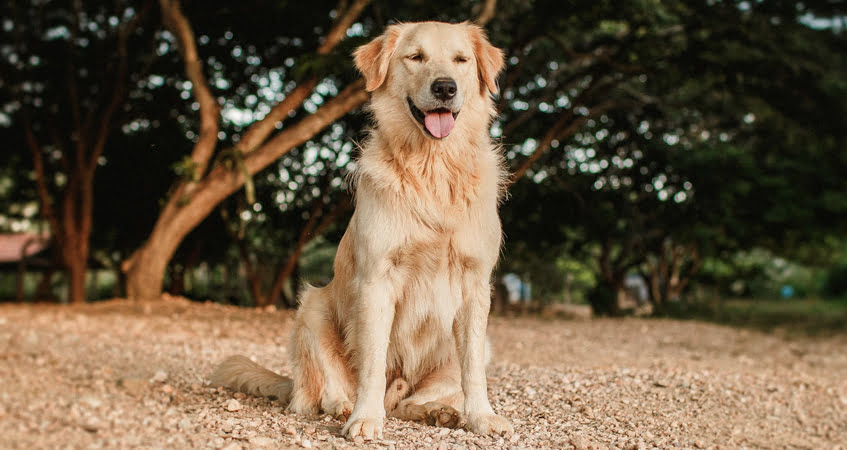Golden retrievers are known for their playful nature and friendly demeanor, but have you ever wondered why they can be so clingy? Well, you’re in for a treat because we’re about to dive into the fascinating world of golden retriever behavior!
If you’ve ever owned a golden retriever, you’ve probably experienced their unrelenting desire to be by your side at all times. Whether you’re sitting on the couch, working at your desk, or even just going to the bathroom, these lovable dogs will stick to you like glue. But why is that? Let’s find out!
One reason why golden retrievers are so clingy is their innate need for companionship. These dogs were originally bred to be hunting companions, and their natural instinct is to be close to their human pack. They thrive on social interaction and simply crave your love and attention. So, don’t be surprised if your golden retriever follows you around the house like a shadow!
In summary, golden retrievers’ clingy behavior can be attributed to their innate need for companionship and social interaction. They are highly affectionate dogs who simply adore being around their human family members. So, if you’re considering adding a golden retriever to your family, be prepared to have a loyal and loving companion who will always be by your side!

Why are Golden Retrievers So Clingy?
Golden Retrievers are known for their friendly and affectionate nature, but why do they often display such clingy behavior? In this article, we will delve into the reasons behind this characteristic trait of Golden Retrievers. From their history as loyal companions to their innate desire for social interaction, we will explore the factors that contribute to their clinginess. So, if you’ve ever wondered why your Golden Retriever is always by your side, read on to discover the answers.
1. An Evolutionary Bond
Golden Retrievers were initially bred to be hunting dogs, specifically for retrieving waterfowl. Their strong bond with humans is rooted in their history of assisting hunters in retrieving game. Throughout the years, they developed an innate desire to work alongside humans, leading to their natural inclination to seek human companionship. This evolutionary bond paved the way for their clingy behavior, as they thrive on the constant presence and interaction with their loved ones.
Moreover, Golden Retrievers have a strong sense of loyalty, and their clinginess can be seen as a way of expressing their devotion to their owners. They form deep emotional connections and actively seek physical closeness as a means of reaffirming their bond. This behavior is not only endearing but also a testament to their unwavering loyalty.
Golden Retrievers are also highly trainable, which allows them to develop a strong connection with their owners through positive reinforcement and consistent interaction. Their clingy nature can be attributed, in part, to their desire to please their owners and be an active part of their lives.
2. Social Animals in Need of Company
Another reason why Golden Retrievers may exhibit clingy behavior is that they are inherently social animals. These dogs thrive on companionship and can become anxious or distressed when left alone for long periods. As pack animals, they have an innate drive to be part of a social group, which translates into a need for constant interaction with their human companions.
This social dependency stems from their upbringing as a breed. Golden Retrievers are typically raised as family dogs and are often surrounded by human interaction from an early age. As a result, they become accustomed to constant human presence and can develop separation anxiety if left alone for extended periods.
To alleviate their clingy behavior, it is essential to provide ample socialization opportunities and ensure that they have other forms of companionship, such as interaction with other dogs or plenty of mental and physical stimulation. Engaging in activities that provide mental challenges or adhering to a consistent routine can help them feel secure and reduce their clinginess.
3. Emotional Sensitivity and Empathy
One remarkable aspect of Golden Retrievers is their emotional sensitivity and empathy towards their human companions. They possess an uncanny ability to sense and respond to their owners’ emotional needs, making them excellent therapy and assistance dogs. This sensitivity also contributes to their clingy behavior, as they are attuned to their owners’ moods and provide comfort and support through physical closeness.
Golden Retrievers are known for their ability to provide emotional support in times of distress, and their affectionate nature is a way for them to offer solace and companionship. This emotional sensitivity often results in their desire to be near their owners at all times, as they genuinely strive to provide unconditional love and support.
While their clingy behavior may sometimes be misconstrued as overly dependent, it is important to understand that Golden Retrievers are simply showcasing their empathetic nature and trying to be there for their loved ones.
Dealing with Clinginess: Tips for Golden Retriever Owners
Now that we have explored the reasons behind Golden Retrievers’ clingy behavior, let’s discuss some tips for managing and addressing this characteristic trait:
1. Establish a Routine
Creating a consistent routine helps provide a sense of security for your Golden Retriever. Stick to a regular schedule for feeding, exercise, and social interaction, ensuring they know what to expect and when.
2. Offer Mental Stimulation
Keep your Golden Retriever’s mind engaged through interactive toys, puzzle games, and training sessions. Mental stimulation helps redirect their focus and provides an outlet for their energy, reducing clinginess.
3. Gradual Independence Training
Teach your Golden Retriever to be independent by gradually increasing the amount of time they spend alone. Start with short periods and gradually extend the duration, rewarding them for calm behavior when left alone.
4. Enrich the Environment
Make sure your Golden Retriever has a stimulating environment with plenty of toys, comfortable bedding, and safe spaces where they can relax. This helps alleviate anxiety and provides them with distractions when you’re not available.
5. Consider Professional Help
If your Golden Retriever’s clinginess becomes problematic or excessive, it may be beneficial to seek the assistance of a professional dog trainer or behaviorist. They can provide tailored guidance and strategies to address the clinginess effectively.
Remember, while Golden Retrievers’ clingy behavior can sometimes be challenging, it signifies their deep love and loyalty. Embrace their affectionate nature and make the necessary adjustments to ensure they lead happy, healthy lives alongside their beloved humans.
Key Takeaways: Why Are Golden Retrievers So Clingy?
- Golden retrievers are known for their friendly and affectionate nature.
- They have a strong desire to be close to their human family members.
- Being clingy is rooted in their history as working dogs that relied on humans for guidance and companionship.
- They thrive on social interaction and can feel anxious or lonely when left alone for long periods.
- Proper training and gradual independence-building can help manage clinginess in golden retrievers.
Frequently Asked Questions
Are golden retrievers known for being clingy?
Yes, golden retrievers are known to be a clingy breed due to their strong bond with their owners. Their natural instinct is to be close to their human family and they thrive on companionship.
Why do golden retrievers exhibit clingy behavior?
Golden retrievers exhibit clingy behavior due to their loyal and affectionate nature. They are highly social dogs and form strong attachments with their owners. They seek out constant physical and emotional contact as it makes them feel secure and loved. This clinginess is often a reflection of their desire to be with their human pack members and be part of the family.
Furthermore, golden retrievers are bred to be working dogs, historically used for hunting and retrieving. This has made them dependent on human interaction and companionship. They are happiest when in the presence of their owners and can become anxious or distressed when left alone for extended periods of time.
How can I address clinginess in my golden retriever?
To address clinginess in your golden retriever, it’s important to strike a balance between meeting their need for companionship and promoting independence. Start by gradually teaching them to be comfortable with alone time. Begin with short separations and gradually increase the duration, rewarding them for calm behavior when you return.
Engaging your golden retriever in mental and physical stimulation can also help alleviate clingy behaviors. Provide them with interactive toys, puzzle games, and regular exercise to keep them mentally and physically stimulated. This will help redirect their energy and prevent excessive reliance on human attention.
What happens if a golden retriever doesn’t receive enough attention?
If a golden retriever doesn’t receive enough attention, they can become anxious, bored, and may exhibit negative behaviors. This may include excessive barking, destructive chewing, or even separation anxiety. Lack of attention can lead to stress in golden retrievers and negatively impact their overall well-being.
It’s important to provide them with sufficient mental and physical stimulation, including daily exercise, interactive playtime, and regular socialization. Ensuring they receive proper attention will help keep them happy, balanced, and prevent behavior issues associated with their clingy nature.
Can I train my golden retriever to be less clingy?
Yes, you can train your golden retriever to be less clingy by implementing gradual desensitization and positive reinforcement techniques. Start by teaching them to feel comfortable in their own space. Encourage them to spend time alone in a designated area, gradually increasing the duration.
Additionally, reward calm and independent behavior with treats and praise. This reinforces and encourages their ability to be content and relaxed when not in constant physical contact with their owners. Consistency, patience, and positive reinforcement will help your golden retriever develop more confidence and independence over time.

Summary
So, why are golden retrievers so clingy? Well, it turns out that their clingy behavior is rooted in their breeding history. Golden retrievers were originally bred to be companion dogs, which means they have a strong desire to be close to their humans. This is why they are often labeled as “velcro dogs” – they like to stick close by your side. Another reason for their clinginess is their loving and affectionate nature. Golden retrievers have a natural inclination to seek love and attention from their owners, which can make them appear clingy. Lastly, their intelligence and trainability make them highly adaptable to their owners’ needs, making them more likely to exhibit clingy behavior.
In conclusion, golden retrievers’ clingy behavior is a result of their breeding, their loving nature, and their intelligence. So, if you have a golden retriever who is always by your side, know that it’s just in their nature to be that way – they simply can’t resist showering you with love and affection!
